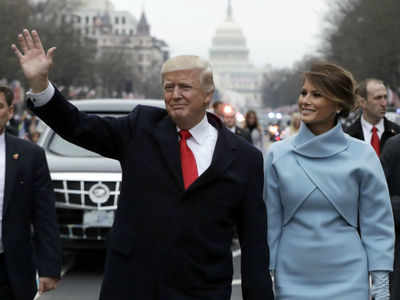- News
- India News
- Daddy of dealmakers in, but will he really be India’s friend?
Trending
This story is from January 21, 2017
Daddy of dealmakers in, but will he really be India’s friend?

Key Highlights
- India should be prepared to deal with fewer H-1B visas, lower US corporate taxes, import tariffs.
- India should move quickly to sew up an investment treaty with the US
- There is no clarity on how the Trump administration would approach the Af-Pak question
"If I’m elected President, the Indian and Hindu community will have a true friend in the White House. That I can guarantee you.” As Donald Trump was inaugurated as the 45th President of the US , this open faith in India is a far cry from where the two countries were even a few years ago.
India’s sense of exceptionalism was fuelled by the George W Bush years. Bush believed India’s rise was good for the world, not merely as a balance to a rising China.That strategic anchor prompted him to push through a landmark nuclear deal, without expecting a return present.
Ashley Tellis of Carnegie , rumoured to be in the running for post of India envoy, advised Trump to keep the big picture in view when dealing with India. The Bush vision, he said, “hinged on two complementarities: one, that the US would continue to remain the ultimate guarantor of Asian security… and two, Washington would persist in strengthening Indian power without any expectations of strict reciprocity because New Delhi’s expanding capabilities advanced the United States’ larger geopolitical objectives”.
Barack Obama, who spent the first couple of years flirting with the idea of a G-2 with China before turning his attention to India, found himself dealing with a politically weakened Manmohan Singh, who not only presided over a disastrous nuclear liability law, but could barely touch other big policies.
Modi and Obama met nine times over the past two years, a frenetic level of engagement that saw a raft of bilateral deals but also global convergences, particularly on climate change.
His statements so far have indicated he is prepared to be tougher on China and jihadi terrorism. Tellis advises the incoming Trump administration to keep America’s larger strategic interests in mind while dealing with India. But the India-Trump party might be impacted on a couple of issues — H-1B visas, trade and investment. Indian technology companies will be impacted severely if Trump follows through with a narrow definition of America First.
India should be prepared to deal with fewer H-1B visas, lower US corporate taxes, import tariffs. Experts believe India should move quickly to sew up an investment treaty with the US. Second, there is no clarity on how the Trump administration would approach the Af-Pak question. That could seriously affect relations with India. Third, how Trump deals with Russia and Iran could indirectly impact India. A more normalised relationship between the US and Russia would be welcomed in New Delhi. This won’t be easy. On Iran, if Trump moves towards repudiating the nuclear deal, the US might find Europe, China and India perfectly willing to engage Tehran, in defiance.
India’s sense of exceptionalism was fuelled by the George W Bush years. Bush believed India’s rise was good for the world, not merely as a balance to a rising China.That strategic anchor prompted him to push through a landmark nuclear deal, without expecting a return present.
Ashley Tellis of Carnegie , rumoured to be in the running for post of India envoy, advised Trump to keep the big picture in view when dealing with India. The Bush vision, he said, “hinged on two complementarities: one, that the US would continue to remain the ultimate guarantor of Asian security… and two, Washington would persist in strengthening Indian power without any expectations of strict reciprocity because New Delhi’s expanding capabilities advanced the United States’ larger geopolitical objectives”.
Barack Obama, who spent the first couple of years flirting with the idea of a G-2 with China before turning his attention to India, found himself dealing with a politically weakened Manmohan Singh, who not only presided over a disastrous nuclear liability law, but could barely touch other big policies.
The next few years were spent by Obama giving India the “what-have-you-done-for-me-lately” treatment, and India-US relations drifted into somnolence. Narendra Modi, famed for being equally transactional, succeeded in re-energising ties. India fixed the liability hurdle, and even though the first commercial contract will only be signed later this year, it cleared a key bottleneck.
Modi and Obama met nine times over the past two years, a frenetic level of engagement that saw a raft of bilateral deals but also global convergences, particularly on climate change.
Donald Trump has already been sold as the daddy of dealmakers, so the first summit meeting between him and Modi will be closely watched.
His statements so far have indicated he is prepared to be tougher on China and jihadi terrorism. Tellis advises the incoming Trump administration to keep America’s larger strategic interests in mind while dealing with India. But the India-Trump party might be impacted on a couple of issues — H-1B visas, trade and investment. Indian technology companies will be impacted severely if Trump follows through with a narrow definition of America First.
India should be prepared to deal with fewer H-1B visas, lower US corporate taxes, import tariffs. Experts believe India should move quickly to sew up an investment treaty with the US. Second, there is no clarity on how the Trump administration would approach the Af-Pak question. That could seriously affect relations with India. Third, how Trump deals with Russia and Iran could indirectly impact India. A more normalised relationship between the US and Russia would be welcomed in New Delhi. This won’t be easy. On Iran, if Trump moves towards repudiating the nuclear deal, the US might find Europe, China and India perfectly willing to engage Tehran, in defiance.
End of Article
FOLLOW US ON SOCIAL MEDIA










